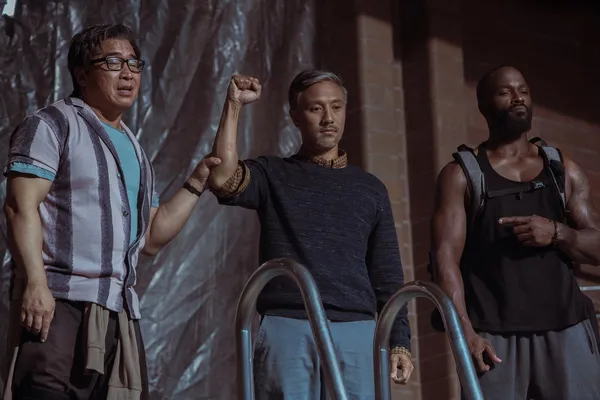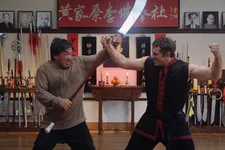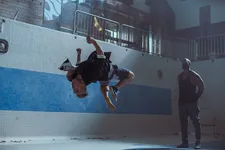 |
| Ron Yuan, Alain Uy and Mykel Shannon Jenkins as The Three Tigers Photo: Mark Malijan |
Made on a small budget but prepared to make a big splash as part of this year’s Fantasia line-up, Bao Tran’s Paper Tigers follows three middle-aged former martial artists who have to brush up their old skills when suspicions develop about the sudden death of their old sifu. They’re not as fit as they used to be but they soon realise that they’ll need to improve if they’re to have any hope of getting to the truth, defending the honour of their school or even staying alive. Fighting and comedy come together in this entertaining indie. I asked its director why he decided to make a martial arts film about men of this age.
He laughs. “I think I was really interested because I was starting to become that man of a certain age. I grew up watching films and practising martial arts so I guess a lot of those values that were instilled in me at a young age, and I was starting to feel a little burnt out. It was an interesting theme to explore, these things that were important to us when we were young and whether they were still important and relevant to us as we grew older. I started brainstorming around that and started finding the story for it.”
 |
| In training Photo: Alwin Szeto |
This scenario also means that the men have different priorities from those of most martial arts heroes, and more to lose.
“Yeah. I wanted to be able to find something interesting like that to give it a little more push towards action because you know, you can always have these action scenes but I was really interested to see what would happen to these characters when it’s not just the motive of winning the fight but also the consequences of it.
“They’re bruised afterwards and it doesn’t go away. I was a big fan of Chinatown, you know, where you have Jake who gets his nose cut and for the rest of the movie he has this bandage on it. It grounds it, it always feels a little bit real. When the wounds disappear it just feel like ‘On to the next one!’ We wanted to really immerse the audience into this world and keep going through that journey for all the characters.”
It’s said in the film that a sifu is always a sort of father figure, but that’s complicated by one of the characters, Danny, actually being a father and having to work out how to advise a son who keeps getting into (and losing) schoolyard fights.
“It’s sort of a story of rebirth,” he reflects, “starting to rediscover what you had valued – but then you start to realise you value it for the real reasons versus the wrong reasons. There’s a scene at the beginning where the sifu tells them why it’s not always meant to be, because he’s been through it, he’s been through a journey of his own, obviously, but the kids have yet to learn that. it seems that process of a student becoming a teacher is also learning what exactly are the lessons you need to pass on.”
Are the rumours true that he was told by some studios that they would be more willing to finance the film if there were fewer Asians in it?
He laughs. “Well, you know, Hollywood is a strange beast. Obviously there are people who have many different motives and interests in terms of funding a film. We went through the rat race of trying to get this funded by a studio, or even a smaller studio, only to end up making it independently – which, all things told, was worth it in the end, I think. It all paid off for us. But we did go through the whole process because raising money is the hardest part of making a film.
“When you talk to companies and studios they’re looking at many different things, especially box office success or actors who have clout or proven metrics, so they were saying ‘If you have Asian American or black American characters in your film, we don’t have a lot of actors out there that are bankable, that can fill those roles.’ Then it becomes this thing of ‘Why don’t you change those characters to white Americans? Then we can have a bigger pool of casting.’ But in many ways that’s code for ‘We don’t like your story but we basically want to co-opt it.’
 |
| A matter of honour Photo: Al’n Duong |
“So that was a process of self-discovery for us and realising ‘Well, this is what we do want and this is what we don’t want,’ But that’s the typical conversation and almost, I would say, the first thing out of the gate from companies that have a certain amount of cachet and money. That’s something we learned very hard. They hold onto the purse strings very tightly so they’re not going to take a bet on a film with diverse characters. Unfortunately that’s the way it is. Trying break through that Catch 22 of multicultural stories is that we have to tell our own stories first and prove that success. it was a hard lesson but now I feel like we have this clarity about ourselves and we don’t need that kind of noise in our lives.”
It’s a situation that makes it hard create stars.
“Yeah. If you don’t have bankable ethnic minority stars then how do you make them? Well, you have to cast them in stories. The onus is on independent filmmakers because bigger studios won’t take that risk. So we do the heavy lifting and the studios will reap the profit. There’s a lot of A-list actors now, like Michael B Jordan for example, he started in independents. He would probably not have got the time of day if he’d gone through the regular studio route. He had to make his name and make his worth in independent film first.”
I heard that a bit of luck came their way in the form of an opportunity to participate in a fundraising event at the Cannes Film Festival.
“Yes! Cannes was an amazing experience. We were part of the Frontieres market, which is a cooperation between Fantasia and Cannes. it’s basically an incubator for genre films that are in various stages of development. We were fortunately able to be a part of the last two stages: the packaging and the proof of concept. Frontieres has been indispensable in supporting the film. When you start pitching in the marché at Cannes it’s a very different way to see how films are made and, in many ways, to see how the sausage is made.” He laughs. “It was all very valuable.”
Did going independent give them more control over casting in general?
“Absolutely. Being independent just gave us so much freedom and our own creative licence and ownership of it. You don’t have to take these considerations of who’s a bankable person or how known a person is. You don’t have to worry about that, so it really came back to who was best for the film. That was really freeing.
“The acting community for Asian Americans and black Americans is actually quite small and tight knit, so we didn’t have to reach out too far. We kind of knew, within one or two degrees of separation, ‘Oh, this actor and that actor,’ and such and such. We could also have people vouch for them, if we had friends or friends of friends who knew them, which is so important on an independent film because the margin of error is so tight. We can’t deal with egos.
 |
| Tigers versus young lions Photo: Mark Malijan |
“I think that’s the other thing with studios. When you have a studio, you’re going to have a star, and most of the time when a star comes with it, it comes with an ego, and there goes your budget. You have to pay for a trailer and all these amenities for that person. There’s a lot of wastefulness in studio filmmaking. So that kept us small, it kept us mobile, it kept us light and able to cast people who were right for the role but also had the right attitude.”
Was it difficult to find actors who could handle the physical demands of the film, as well as looking out of shape?
“Well, out of shape wasn’t so hard! One of the constant creative discussions that me and my producers would have is just what kind of martial arts film did we want to make. Did we want to find an actor that was known for martial arts and known for doing stunts and all that stuff and then try to push them to be able to perform the more challenging dramatic scenes and comedic scenes, or find an actor who was really good at what they do but can learn the martial arts. Even down to the wire, that was one of the final decisions of casting. Either way could change the tone and the whole pitch of the film completely.
“Fortunately with Ron [Yuan], who plays the part of Hing, he’s a veteran stunt actor and martial arts actor ad he’s a great actor on his own too so we scored with him, but with Alain [Uy], who plays Danny, he does have some martial arts experience but I think it’s from when he practised as a youth and he never really kept it up. But in a lot of ways that worked on the side of the film because our characters are meant to be out of shape, our characters are meant to be a step behind and our characters are meant to be a little bit out of sync with what they’re trying to do. We kind of ran with it and embraced it creatively. I hope it paid off and I think people will be really pleased to see what he was able to do.”
Despite the characters’ lack of recent practice we have to have a bit of faith in their ability, I suggest, so that it’s believable that they won’t just be crushed in their first fight.
“Yes, the audience needs to have a little bit of that. They’re not wet noodles, you know? We always wanted to write that edge of ‘Will they win or won’t they win?’ That’s an important part of the stakes and the expectation that we wanted to play with. If we knew they were just going to lose outright it wouldn’t be very fun, and also of we knew they were going to win outright, like when you see an action movie and the hero just ploughs through everyone, there’s no tension or suspense about what the outcome is.”
How does he feel about the film screening at Fantasia?
“Fantasia’s wonderful. We are in some fairly interesting times and virtual is a new experience for all of us but I’m really impressed by what they’ve done so far in getting ahead of it. They had planned to go virtual early and committed to it, as opposed to some fests either cancelling outright or just postponing, so I really commend them for what they’re doing. I’m excited for Fantasia as a world première because I think it’s a wonderful home for us.
“The only thing, obviously, is not being able to be in the same room together and watch it together. That’s a big disappointment but, you know, we try to do what we can and hopefully now, in this online edition, we can reach out to press who might not usually be able to cover this festival, so it opens other doors. This one’s streaming only to Canada but hopefully people who wouldn’t have been able to get to Montreal normally will be able to see it. We’re excited to see what happens.”
The film has already been accepted into several further festivals but he’s not allowed to talk about them yet. For the meantime, he’s working on other projects, but global circumstances make their fate more uncertain than ever. He’s also wondering whether the or not films made from here on out will acknowledge the pandemic. “I guess we’ll see where the chips may fall,” he concludes.
Paper Tigers screens at Fantasia on Sunday 30 August and Tuesday 1 September.





















